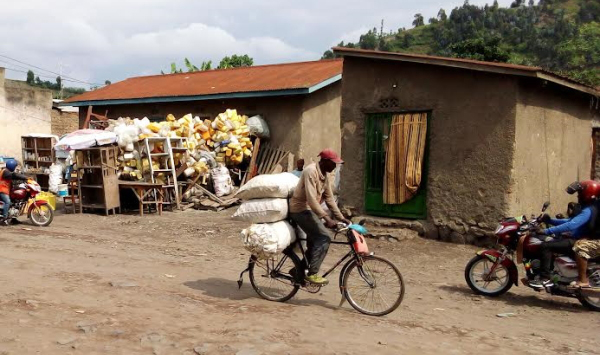
By Chris Elliott, a farmer and pastor from Pennsylvania who is serving with his daughter, Grace, in Rwanda on behalf of the Office of Global Mission
The other morning, Papa Timo and I delivered several sacks of feed to the pig farm (Global Food Initiative supported). Anytime we go somewhere together, Papa Timo will typically ask me to drive. I’m not certain of the psychology behind that, but I really don’t mind. Driving in Africa is quite a bit different that it is in the US. Though there are fewer cars and trucks on the road, the number of bicycles, motorcycles, farm animals and pedestrians can be overwhelming. At first I was extremely nervous, and while that has diminished significantly, I’m still very cautious.
There are a few paved roads, but most are very rough and rocky country roads. Drivers are constantly looking for the path of least resistance, weaving back and forth attempting to dodge the rocks, ruts, mud and washouts. Papa Timo’s main vehicle is a 1990’s Toyota Land Cruiser. It is essentially a pickup truck chassis with a station wagon body, making it ideal for carrying people and cargo over the bumps.
On this particular day, as we approached a spot where the road dips down sharply through a steep ravine, a queue of bicycles loaded with potatoes was waiting to traverse one at a time. With a couple hundred kilos of produce on their bikes, it was necessary to help each other hold back on the downside and push on the upside. A few 5-to-7-year-old boys jumped in to help. After a brief delay, we passed through and were on our way.
In the center of the village, we encountered a score of young men standing around with their hoes and shovels hoping to be hired for the day. All farm work is done with hand tools; there are no tractors or farm machinery. Unlike Americans, Rwandans don’t do things alone and will hire day laborers for the job. The locals have a word for plowing, cultivating, and harvesting that translates to “digging.”
Biblical allusions come quickly to mind. In the parable of the unjust steward, the steward said, “I cannot dig” (Luke 16:3). And, of course, there is the parable of the workers in the vineyard (Matthew 20:1-16) where the workers are waiting in the village square to be hired for the day. Coming from a farm background, I have always felt that “us farmers” have an edge on most others when it comes to understanding Jesus’ parables. Now I realize how much closer these folks are to the Bible’s truth because they live in it so much more fully every day.
Even Jesus’ words in The Lord’s Prayer come to life in a richer way: “Give us this day our daily bread” (Luke 11:3). I have often made the remark that the average unemployed person in the US is better off than the average employed person most anywhere else in the world. This isn’t meant to trivialize the pain that any one individual might be experiencing, but for us to recognize that a very large number of people worldwide live on a dollar or two a day. They are literally trusting God for something to eat today, one day at a time. I’m gaining a new perspective on hunger and malnutrition.
When I’m out on the road I’ll be alert to the hazards. And I’ll keep my eyes open for the Bible lessons, too.
Find more updates about the ministry of Chris and Grace with the Church of the Brethren in Rwanda at www.brethren.org/global or support their work today at www.brethren.org/give-rwanda.

